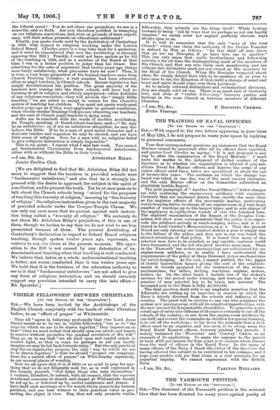THE TRAINING OF NAVAL OFFICERS.
[To TER EDITOR Os TRY " SPECTATOR:1
SID,—With regard to the two letters appearing in your issue of May 12th, I do not propose to waste your space by replying to personal comments.
Your first correspondent questions my statement that the Royal Marines cannot be preserved after all its officers have vanished, and quotes Lord Cawdor as saying : " It is not proposed in any way to alter the organisation of the Royal Marines." I must leave the matter to the judgment of skilled readers of the Spectator as to whether the organisation is altered if you sub- stitute Naval for Marine officers, and deprive the corps of any junior officers until these latter are specialised at about the age of twenty-five years. The evidence on which the change was based was taken in one day, was of the most cursory character, and the only Marine officer on the Committee submitted an absolutely hostile Report.
The next paragraph of " Another Naval Officer's " letter charges me with confusing the engine-room artificers with engineers. Certainly they are engineers drawn from exactly the same class as the engineer officers of the mercantile marine, performing watch-keeping duties in charge of one engine-room in a very large number of warships up to the largest types, and in sole charge of the machinery in eighty-four vessels of over two hundred tons. The slightest examination of the Report of the Douglas Com- mittee will show your correspondents that the policy is to super- sede the artificers entirely in watch-keeping duties, and it is so stated in Lord Cawdor's Memorandum on p. 4. That the present Board are only entering one hundred stokers a year is simply duo to the failure of the policy, and does not in any way touch the absurd intentions of that policy. It is found that many of the selected men have to be rejected, as any capable engineer could have forecasted, and the low standard involves more men. Thus in the Exmouth' ten stoker-mechanicians are substituted for six engine-room artificers, so in reality I have understated the requirements of the policy at three thousand stoker-mechanicians for watch-keeping. As for cost, I cannot publish the two pages of closely typewritten figures giving the cost of the establish- ments in vessels prepared for the instruction of the stoker- mechanicians, the lathes, drilling machines, engines, motors, boilers, doe. On the other hand, I include loss of the stoker's services for the period under training, and wastage due to the number of men rejected has to be taken into account. The increased cost to the State is fully £1,800,000.
The final question dealt with is my emphatic assertion that the Admiralty are setting up an imperium in. imperio in which the Navy is utterly divorced from the schools and industry of the country. The proof will be obvious to any one who compares the system now passing away, with all its admitted imperfections, with the new one and its demonstrable absurdities. To prescribe a uni- versal age of entry into Osborne of 13 years is certainly to cut off the schools of the country ; to cut down the engine-room artificers by one-half, and recruit the remainder as children for special training, is to cut off the workshops ; to lay down the principle that a deck officer must be an engineer, and vice versd, is to sweep away the Royal Naval Reserve officers, however gradual the process. I merely instanced the Worcester' and Conway' Cadets as an example of its application. To make the expense to the parent at least £135 per annum for four years is to exclude whole classes from the rank of officers in the Royal Navy. In the name of many officers of the Navy, I thank the editor of the Spectator for having allowed this subject to be ventilated in his columns, and I hope your readers will see that there is a real necessity for an impartial inquiry. We cannot experiment with the British Navy.










































 Previous page
Previous page